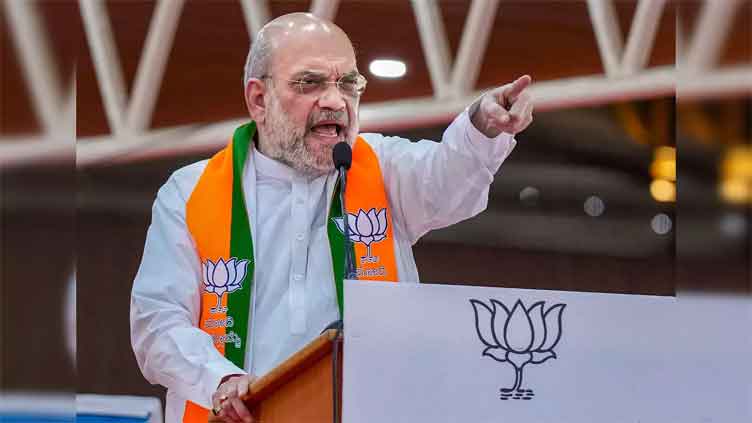DM Monitoring
NEW DELHI: India’s Union Home Minister Amit Shah claimed on Tuesday that the Congress and the National Conference wanted to reinstate Article 370 in the Indian Occupied Jammu and Kashmir.
He made this remark while addressing a public rally in Jammu and Kashmir’s Kishtwar on September 16. Starting his speech by slamming the National Conference (NC) and Congress, he said that Article 370 is now a part of history and there is no place for it in the constitution of India.
It merits mention that article 370 gave a special status to the Kashmir under India’s occupation. The BJP government headed by Narendra Modi and Amit Shah abrogated the article to appease their hardline voters. The action was taken despite severe criticism from the local Kashmiris.
Shah said, “NC and Congress say that they will reinstate Article 370 if their government is formed. Should Article 370 be back?”
“The reservation, which the Pahadis and Gurjar brothers get, would not be possible if Article 370 is restored…But I have been observing the environment in Kashmir, neither Farooq Abdullah nor Rahul Gandhi is forming the government here.”
Continuing the vitriol in his speech, he said “Article 370 is now a part of the history. There is no place for Article 370 in the Constitution of India. There can never be two Prime Ministers, two constitutions and two flags in Kashmir. There will only be one flag and that is our Tricolour.”
Earlier, For decades, boycotting elections in Indian-controlled Kashmir was a sign of protest against Indian rule.
That may change on Wednesday, when many residents of the Muslim-majority region say they’re willing to use their vote in a local election to deny Prime Minister Narendra Modi’s party the power to form an administration in the disputed region.
The vote is the first in a decade, and the first since Modi’s Hindu nationalist government in 2019 scrapped the region’s special status and downgraded the former state to a federally governed territory. The move — which largely resonated in India and among Modi supporters — was mostly opposed in Kashmir as an assault on its identity and autonomy.
“Boycotts will not work in this election,” said Abdul Rashid, a resident in southern Kashmir’s Shangus village. “There is a desperate need to end the onslaught of changes coming from there (India).” Indian security forces walk past Indian flags and flags of India’s ruling Bharatiya Janata Party (BJP) as a motorcycle rally by BJP youth wing to the Kargil War Memorial passes through Srinagar, Indian controlled Kashmir, Monday, July 25, 2022. (AP Photo/Mukhtar Khan, File)
The election will allow Kashmir to have its own truncated government and a local assembly, instead of remaining under New Delhi’s direct rule.
The region’s last assembly election was held in 2014, after which Modi’s Bharatiya Janata Party for the first time ruled in a coalition with the local Peoples Democratic Party.
This time, New Delhi says the polls are ushering in democracy after more than three decades of strife. However, many locals see the vote as an opportunity not only to elect their own representatives but also to register their protest against the 2019 changes.
Polling will be held in three phases. The second and third phases are scheduled for Sept. 25 and Oct. 1. Votes will be counted on Oct. 8, with results expected that day.
Kashmir is divided between nuclear-armed rivals India and Pakistan. Since 1947, the neighbors have fought two wars over its control, after British rule of the subcontinent ended with the creation of the two countries. Both claim the Himalayan territory in its entirety.
In 2019, the Indian-controlled part of the region was divided into two territories, Ladakh and Jammu-Kashmir, ruled directly by New Delhi. The region has been on edge since it lost its flag, criminal code, constitution and inherited protections on land and jobs.



